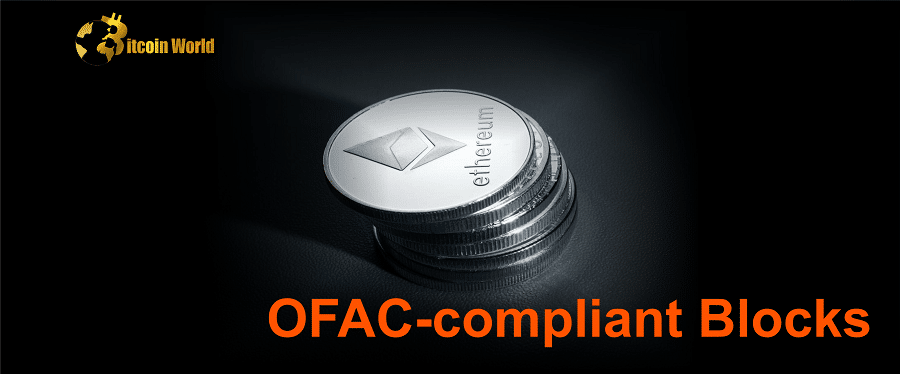The drop to 47% occurs nearly three months after the percentage of OFAC-compliant blocks peaked at 79% on November 21.
The percentage of Ethereum blocks that comply with directives issued by the US Office of Foreign Asset Control (OFAC) has now dropped to 47%, the lowest since October 11.
The latest victory in the fight against censorship comes nearly three months after the percentage of OFAC-compliant blocks peaked at 79% on Nov. 21.
OFAC-compliant blocks are those that exclude transactions involving parties sanctioned by the Office of Foreign Assets Control of the United States Treasury Department.
A decrease of compliant blocks may be interpreted as a victory for those who resist censorship inside the Ethereum ecosystem.
The founder of MEV Watch, blockchain consulting firm Labrys, stated in a statement that the drop might be linked to more validators electing to utilize MEV-boost relays that do not filter transactions in compliance with OFAC standards.
“In particular, the BloXroute Max Profit relay, Ultrasound Money relay and Agnostic Boost relay have picked up most of the change in market share.”
MEV-boost relays serve as trustworthy intermediaries between block producers and block builders, allowing Ethereum validators to delegate block production to other block builders.
In a Feb. 14 statement, Lachlan Feeney, CEO of Labrys, stated that he is pleased with how the Ethereum community has responded to the censorship issue since it first arose post-Merge.
He emphasized that the recent drop of censorship-compliant blocks was especially significant because it was done without the assistance of a user-activated soft fork (UASF). He mentioned that “several individuals” of the Ethereum community had advocated for the soft split prior to the merging in order to resist censorship.
“I am really happy of the Ethereum community for the progress we have achieved on this problem,” Feeney stated, adding:
“When we released the MevWatch tool drawing attention to a flaw within Ethereum, the community did not stick its head in the sand but instead rose to the occasion and made significant progress addressing the issue.”
However, “there is still more work to be done,” according to Feeney.
On August 8, OFAC sanctioned Ether (ETH) and USD Coin (USDC) wallet addresses that use the Ethereum-based privacy mixing application Tornado Cash.
On September 16, just 9% of blocks were OFAC-censored after the first 24 hours of Ethereum’s new proof-of-stake consensus mechanism.
On November 21, however, this percentage skyrocketed to 79% in just two months.
The percentage of OFAC-compliant blocks then fluctuated between 68 and 75% until January 29, when it fell to 66%. Despite a few tiny surges, it has consistently fallen since then.














